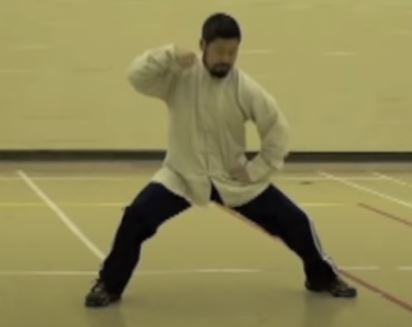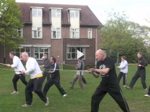(I originally posted this on Facebook, but was asked to also post here, so here goes. Readers shouldn’t take any of this seriously, I am a total beginner in Practical Method)
I listened to the Tai Chi Day podcast interview of Master Chen, and two things struck me.
First, I find it very fascinating that Hong Junsheng’s ‘feel’ (sorry I don’t know the right technical term) is very different from master Chen’s.
Master Chen said he had 3 distinct sources of skills (1 from his specific physique, 1 from Hunyuan, 1 from ‘Hong style’) so what we feel when we get instruction is very different from master Chen is often a composite ( at least that is what I understood, I could be wrong) so for example we feel that master Chen has a strong grip – I’ve felt it, like talons of steel, – this apparently comes from his work with the Hunyuan system- , whereas Master Hong Junshen didn’t ‘grip’ and had a completely ’empty’ feel, so when you fell down you’d think it was something wrong you did, and not something he did. I find the idea of each master developing a personal ‘feel’ very intriguing.
Another thing I found interesting in the podcast was one of the interviewers saying that a good part of his motivation was to be part of a lineage, with a sense of history, and a feeling of being part of something larger than himself etc.
These are great, noble, motivations.
But it also struck me (somewhat depressingly) that none of this is a part of *my* motivation for learning Practical Method . I’d *like* to believe that I also have such noble motivations, but unfortunately, this is not true.
I have purely pragmatic motivations – started with “only increased health, who cares for fighting ability ” as my motivation, but after master Chen (in Bali 2019 conference) pointed out that ‘increased health’ and ‘martial ability’ cannot be separated, and are two sides of the one coin of Tai Chi learning, I’ve changed my mind and now want martial ability as well, but more as a *measure* of how well (or badly) I’m learning, what I have to correct and improve, and not because of its value in a real fight – I’ll almost certainly not get into a real fight in my lifetime, and I don’t want to be Push Hands champion (or get any other awards or titles)
I also learn because (after encountering Master Chen in person, till when I was somewhat skeptical) that Practical Method is something very unique, and very special, in a Tai Chi ‘landscape’ dominated by woo woo mysticism and ‘chi magic’, and I want to learn that because it is so special, rare and *effective* today (as constantly demonstrated by Master Chen)
Some arts glow like pure gold in a fog of lost historical arts obscured by present mumbo jumbo and mysticism (India has plenty of these, empty shells of words with the real wisdom and technique long lost), and Practical Method, as taught by master Chen, shines bright and clear *in the present* , without depending on legends of past masters, or ‘chi magic’ talk for a halo effect. Irrespective of who founded it how many years ago, and how much into ancient history the legacy chain stretches, Practical Method is a very precious thing that embodies some fine *qualities* – effectiveness, elegance, precise controletc -, and I want to learn so that I can absorb some of these *qualities* via practicing this system. That is a much more self centered motivation than the ones exhibited by the interviewer.
So, I’m personally *not* motivated by (being part of) lineage, or being part of a historical chain of people etc, perhaps because I grew up in India, where these things are widely prevalent for many many arts/crafts/’sciences’ etc for good and ill.
Ok enough philosophizing (hey what’s Facebook for!) and back to doing more yilu. I really appreciate that listening to this podcast made me reflect on my own motivations for learning PM. I think it is important to clearly understand why one does something. This podcast made me think, and I am grateful to the podcasters.
My present Tai Chi goal: Finishing learning Yilu choreography (and Hunyuan 12 choreography).
Then do 10,000 yilu (inspired by Kelvin Ho), and a corresponding number of Foundations reps.
Then get more instruction.
Less philosophy, more practice!
Back to work.


